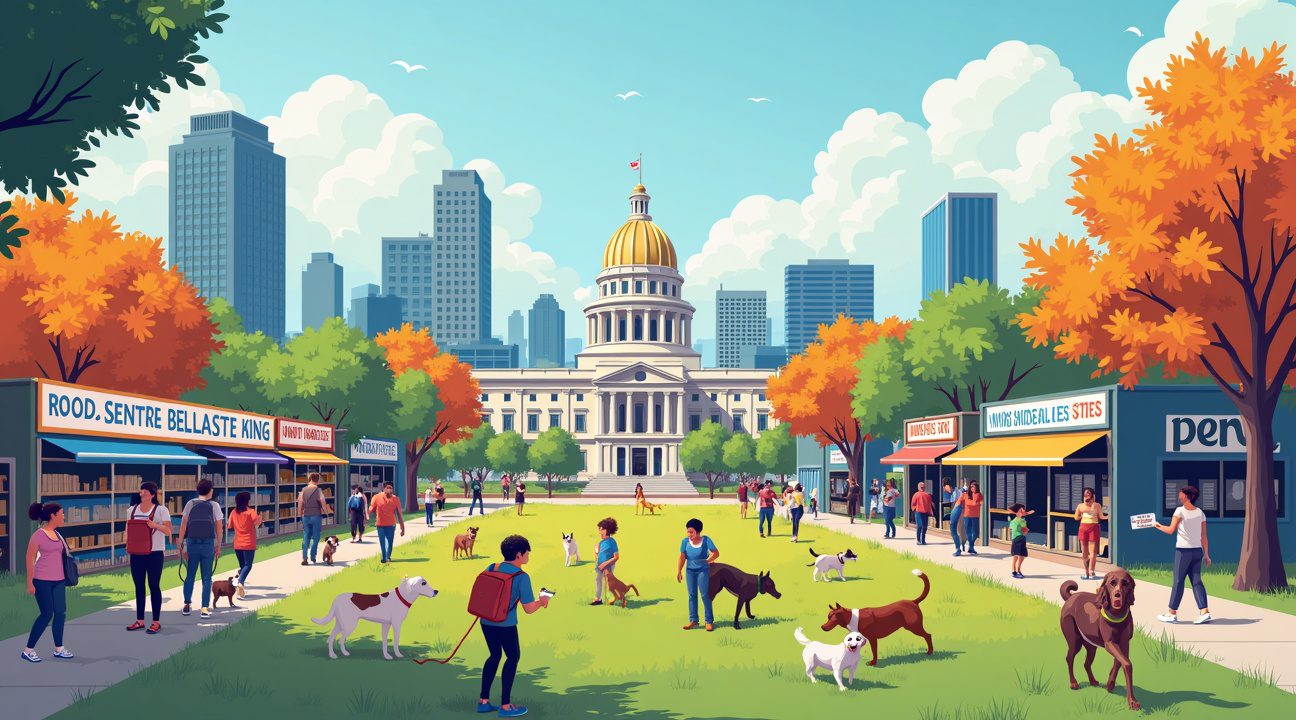Denver Bans Retail Sale of Dogs, Cats, and Rabbits in Pet Stores
Denver City Council enacted a groundbreaking ordinance on September 15, 2025, banning the retail sale of dogs, cats, and rabbits in pet stores throughout the city.
This significant legislation marks Denver as the 26th municipality in Colorado to enforce such a ban. The move responds to a growing crisis in animal shelters, with 634 dogs surrendered in just the first 138 days of 2025—a staggering 237% increase compared to the same period in 2019. The ordinance also seeks to curb the influence of puppy mills and predatory financing schemes, which can saddle consumers with interest rates as high as 36%.
Key Takeaways
- Denver joins over 500 municipalities nationwide in banning commercial pet sales. Local breeders, state-licensed operations, and animal adoption events are still permitted under specific exemptions.
- The city’s animal shelter is under historic strain with nearly five dogs arriving daily. Contributing factors include increasing veterinary costs, housing instability, and overall economic challenges affecting pet ownership.
- Federal oversight of commercial breeding facilities remains minimal. Nationwide, only 77 USDA inspectors are tasked with monitoring over 17,000 operations, leaving many facilities unchecked.
- Predatory financing practices in pet stores remain a concern, with interest rates reaching up to 36%. A $6,000 puppy can cost nearly $10,000 by the end of a three-year payment plan.
- Shelters are countering the crisis with new adoption incentives, including $31 adoption fees for cats and dogs over a year old, free spay/neuter services, and comprehensive outreach programs to support new pet owners.
To learn more about humane regulations and responsible pet adoption policies, visit the Humane Society’s puppy mills resource page.
https://www.youtube.com/watch?v=aTCLyBoTPJg
Denver Joins 25 Other Colorado Cities in Preemptive Pet Store Ban
Denver City Council made history on September 15, 2025, by passing an ordinance that bans the retail sale of dogs, cats, and rabbits in pet stores throughout the city. Mayor Mike Johnston still needs to sign the legislation before it becomes official law, but the measure represents a significant step forward in animal welfare policy.
This move places Denver as the 26th Colorado city to implement such restrictions, joining a growing movement that spans eight states and over 500 municipalities nationwide. Currently, no pet stores in Denver sell these animals, making this ordinance a strategic preemptive measure rather than a response to existing problems.
Key Exemptions and Protections
The new ordinance carefully balances animal welfare concerns with legitimate breeding and adoption activities through several important exemptions:
- Responsible local breeders who sell directly to the public can continue their operations without restriction
- State-licensed breeders maintain their ability to conduct business as usual
- Shelter adoption events remain fully supported and encouraged
- Rabbits sold at special events like the National Western Stock Show are specifically exempt
- Pet stores can still host adoption events when partnering with animal shelters
These exemptions ensure that legitimate breeding practices and adoption efforts continue while targeting commercial operations that often source animals from problematic puppy mills and similar facilities.
The timing of Denver’s decision aligns with broader state-level animal protection efforts. Colorado recently enacted HB 25-1180, which prohibits the sale of any pets in public spaces such as parking lots or from vehicles. This complementary legislation strengthens the overall framework protecting animals from potentially harmful commercial practices.
Pet stores affected by the ban can still play a vital role in animal welfare by partnering with local shelters for adoption events. This approach maintains business opportunities while redirecting focus toward animals that desperately need homes rather than those bred specifically for profit.
The ordinance reflects growing recognition that retail pet sales often contribute to overpopulation problems in shelters while supporting breeding operations that may not prioritize animal welfare. By eliminating these commercial sales channels, cities like Denver create incentives for potential pet owners to consider shelter animals first.
Once Mayor Johnston signs the ordinance, Denver will join municipalities across the country that have successfully implemented similar bans without negative impacts on legitimate pet ownership or responsible breeding practices. The measure represents a thoughtful approach to animal welfare that protects both animals and responsible industry participants while addressing the root causes of pet overpopulation.

Record-Breaking Shelter Surrenders Drive Need for Adoption Focus
I’ve witnessed firsthand how Denver Animal Shelter faces an unprecedented crisis that’s reshaping the city’s approach to pet sales. The facility has seen 634 dogs surrendered in just the first 138 days of 2025—nearly five dogs arriving at their doors every single day. This staggering figure represents a 237% increase compared to the same period in 2019, highlighting a dramatic shift in pet ownership challenges.
The Scale of the Crisis Becomes Clear
The numbers tell a sobering story about Denver’s pet population. Back in 2019, the shelter received 544 dog surrenders for the entire twelve-month period. Fast-forward to 2025, and that annual total was already surpassed within just four months. This acceleration demonstrates how quickly circumstances have changed for pet owners across the metro area.
Even more concerning, surrenders specifically for euthanasia have skyrocketed from 38 dogs in 2019 to 119 dogs in the current year. Such increases signal that families aren’t just dealing with temporary housing issues—they’re facing situations where they believe they have no other options for their beloved pets.
Common Breeds and Contributing Factors
The breeds showing up most frequently at Denver Animal Shelter include several that require specific care considerations:
- Chihuahuas, often surrendered due to behavioral challenges in apartment settings
- Labradors, whose high energy needs become difficult to manage without adequate space
- Huskies, requiring extensive exercise that many owners can’t provide consistently
Rising veterinary costs have become a primary driver behind these surrenders. When routine medical care becomes unaffordable, pet owners face impossible choices between their animal’s health and their family’s financial stability. Housing insecurity compounds this problem, as finding pet-friendly rental properties grows increasingly difficult in Denver’s competitive real estate market.
Denver Animal Shelter operates as an open-admission facility, meaning they accept nearly 10,000 lost and abandoned pets annually regardless of space constraints or the animal’s condition. This policy ensures no pet gets turned away, but it also means the facility constantly operates at or beyond capacity during peak surrender periods. Staff members work tirelessly to match animals with suitable families, but the sheer volume of incoming pets has made traditional adoption efforts insufficient to address the growing need.
Puppy Mills and Consumer Protection Concerns Fuel Legislative Action
Commercial breeding facilities continue to operate under conditions that would shock most pet lovers. Recent rescue operations in Colorado highlight the severity of these problems. Animal welfare organizations rescued over 250 dogs and cats from a single breeding facility, while another operation discovered 31 dogs living in deplorable conditions in Commerce City. These cases represent just the tip of the iceberg in an industry that prioritizes profit over animal welfare.
The financial burden on unsuspecting consumers extends far beyond the initial purchase price. Puppies from commercial mills frequently carry expensive, undisclosed health problems that create devastating financial strain for families. Many pet owners face heartbreaking decisions when veterinary bills exceed their financial capacity, sometimes leading to euthanasia for animals that could have been saved with proper breeding practices.
Pet stores compound these problems through predatory financing schemes. Third-party lenders offer payment plans with interest rates reaching as high as 36%. A family purchasing a $6,000 puppy through financing at this rate would pay nearly $10,000 over three years. These arrangements trap consumers in cycles of debt while supporting an industry that perpetuates animal suffering.
Federal oversight remains woefully inadequate to address these widespread problems. The USDA employs only 77 inspectors to monitor 17,000 commercial breeding facilities nationwide. This skeletal inspection force cannot possibly ensure compliance with even basic animal welfare standards, allowing substandard operations to continue harming animals and deceiving consumers.
Health Risks Extend Beyond Animals
Poor breeding practices create risks that extend to human health as well. Inbreeding and unsanitary conditions in commercial facilities can lead to zoonotic diseases that transfer from animals to humans. These health concerns add another layer of urgency to legislative efforts aimed at curbing the commercial pet trade.
The combination of animal welfare violations, consumer fraud, and public health risks creates a compelling case for legislative intervention. Denver’s new law addresses these interconnected problems by eliminating the market for commercially bred animals while directing potential pet owners toward shelter adoption programs. This approach protects animals, consumers, and public health simultaneously while supporting local animal welfare organizations that desperately need adoptive homes for rescued animals.
Commercial breeding operations thrive on consumer ignorance about their practices. Many buyers assume pet store animals come from reputable breeders when they actually originate from facilities that prioritize quantity over quality. The new legislation forces transparency in pet acquisition while encouraging more ethical alternatives that benefit both animals and families seeking companion pets.
https://www.youtube.com/watch?v=JnAXsK_Lq00
Boosting Shelter Adoptions Through Community Initiatives
Denver’s new ordinance creates a direct pathway that steers pet-seeking residents away from commercial retailers and straight into local shelters. This strategic redirection addresses the city’s goal of reducing shelter overcrowding while ensuring homeless animals find loving families instead of competing with commercially bred pets.
Local shelters have responded to this opportunity by implementing attractive adoption incentives. During October 2025, prospective pet parents can adopt cats and dogs over one year old for just $31, making pet ownership more accessible to families across different income levels. These promotions operate on a first-come, first-served basis, which means interested adopters can’t reserve specific animals in advance—a system that encourages quick decision-making and keeps the adoption process moving efficiently.
Comprehensive Support Programs
Beyond adoption fee reductions, Denver shelters have launched several support programs that address common barriers to pet ownership. The shelter system now offers low-cost and free spay/neuter services, recognizing that upfront medical costs often deter potential adopters. The Pay to Spay initiative specifically targets pit bull adoptions by providing completely free spay/neuter procedures along with $100 grocery gift cards as additional incentives.
These grocery incentives serve a dual purpose: they help offset initial pet care costs while acknowledging that food expenses represent ongoing financial commitments for new pet owners. The program particularly benefits pit bulls, a breed that often faces longer shelter stays due to housing restrictions and breed-specific prejudices.
Denver’s position as the #2 ranked city nationally for dog friendliness creates unique market dynamics that the new law directly addresses. This ranking naturally attracts high-volume pet retailers seeking expansion opportunities in markets where pet ownership thrives. However, the ordinance effectively blocks this commercial pathway while the city maintains its pet-friendly reputation through improved shelter services and community support programs.
The economic impact of this ban appears minimal since most Denver pet stores have already built their business models around product sales and services rather than live animal transactions. Pet retailers continue operating their grooming services, training programs, and retail operations without disruption. This business structure suggests that store owners anticipated regulatory changes or recognized that service-based revenue streams offer more stability than live animal sales.
Community response to these initiatives reflects broader shifts in consumer attitudes about pet acquisition. Many residents now view shelter adoption as the preferred method for finding pets, particularly when shelters offer competitive pricing and comprehensive support services. The combination of:
- Reduced adoption fees
- Medical care assistance
- Ongoing support
creates value propositions that often exceed what commercial pet stores traditionally provided.
Local veterinarians have also embraced these changes by partnering with shelters to provide discounted services for newly adopted animals. These professional partnerships ensure that adopted pets receive immediate medical attention while building relationships between new pet owners and veterinary practices. Such collaborations strengthen the entire pet care ecosystem while supporting the ordinance’s broader goals.
The success of these community initiatives depends heavily on public awareness and engagement. Shelters have increased their marketing efforts through social media campaigns, community events, and partnerships with local businesses. These outreach programs help residents understand available services while showcasing adoptable animals in positive, appealing contexts.
Staff training at participating shelters has also evolved to support these expanded programs. Adoption counselors now receive enhanced training in:
- Financial assistance programs
- Behavioral assessment
- Post-adoption support services
This professional development ensures that potential adopters receive comprehensive guidance throughout their decision-making process.
Looking ahead, the combination of regulatory changes and enhanced shelter services positions Denver as a model for other cities considering similar ordinances. The integration of affordable adoption fees, medical support programs, and community partnerships creates a sustainable framework that benefits animals, families, and local businesses simultaneously.

Economic Pressures and Housing Challenges Impact Pet Ownership
Financial Strain Drives Pet Surrenders
Rising veterinary costs have created a significant burden for pet owners across Denver, forcing many to make difficult decisions about their animals. Pet deposits and additional housing fees compound these financial pressures, particularly as rental markets become increasingly competitive. Housing instability emerges as another critical factor, with many landlords implementing strict no-pet policies or charging substantial monthly fees that stretch already tight budgets.
These economic challenges transform shelter pets into an increasingly vital community resource. Families who might previously have purchased animals from breeders or pet stores now turn to shelters as affordable alternatives. I’ve observed how this shift creates both opportunities and pressures within the animal welfare system.
Shelter Response Strategies
Denver’s animal shelters have adapted to increased intake through creative adoption specials and promotional events. High return-to-owner rates demonstrate successful community outreach efforts, suggesting that many animals entering the system reunite with their families rather than requiring new homes. These programs help manage capacity while maintaining the open-admission policy that serves as a safety net for the community.
Denver’s unique challenges mirror national trends but face additional pressure points. The city’s open-admission policy means shelters cannot turn away animals, even when operating at full capacity. Night drop-off kennels provide 24-hour access for pet surrenders, creating continuous intake pressure that many facilities struggle to balance.
According to Shelter Animals Count’s 2025 mid-year report, national shelter intake shows slight decreases, yet many facilities remain at or above capacity. This data reveals the persistent strain on animal welfare systems despite efforts to reduce intake numbers. Denver’s situation reflects this broader pattern, where economic pressures continue driving pet surrenders even as communities implement various intervention strategies.
Housing challenges particularly affect pet ownership decisions. Rental agreements increasingly include pet restrictions, security deposits that can reach several hundred dollars, and monthly pet fees that add $50–100 to housing costs. These financial barriers force families to choose between housing stability and keeping their pets, often resulting in shelter surrenders.
Veterinary care costs have risen substantially, with routine procedures now costing significantly more than in previous years. Emergency medical situations create particular hardship, as unexpected bills can reach thousands of dollars. Pet insurance adoption remains limited, leaving many owners without financial protection for major medical expenses.
The combination of housing instability and economic pressure creates a cascading effect on pet ownership. Families facing job loss, reduced income, or housing transitions often cannot accommodate pets in temporary living situations. Emergency housing options rarely accept animals, forcing immediate surrender decisions during already stressful circumstances.
Shelters respond to these pressures through targeted programs addressing specific economic barriers. These include:
- Low-cost veterinary clinics
- Pet food banks
- Temporary fostering programs
These intervention strategies prove more cost-effective than managing increased shelter populations.
The demographic shift in pet acquisition patterns reflects broader economic trends. Middle-income families increasingly choose shelter adoption over purchasing from breeders or pet stores, partly due to cost considerations but also growing awareness of shelter animal needs. This trend supports the goals of Denver’s new legislation while addressing community economic realities.
Denver’s night drop-off kennels, while providing necessary service, illustrate the ongoing pressure from housing-related surrenders. Many animals arrive during evening hours when families face immediate housing crises or receive eviction notices. This timing pattern reveals how housing instability directly impacts pet retention.
Community organizations work to address root causes of economic pet surrender through assistance programs and policy advocacy. The most effective strategies include:
- Rent assistance programs that include pet deposits
- Veterinary payment plans
- Pet-friendly housing initiatives
These comprehensive approaches recognize that animal welfare connects directly to human economic stability.

Growing National Movement Toward Animal Welfare Protection
Denver’s groundbreaking ordinance reflects a significant shift in how communities approach animal welfare across the United States. The city joins an impressive coalition of over 500 municipalities and eight states that have enacted similar bans on the commercial sale of dogs, cats, and rabbits in pet stores.
This legislative momentum stems from mounting concerns about animal welfare and the need for stronger consumer protection measures. Pet store animals often come from commercial breeding facilities with questionable practices, while thousands of healthy animals wait in shelters for homes. Communities recognize that retail pet sales perpetuate a cycle that prioritizes profit over animal well-being.
Community Support and Proactive Protection
The ordinance enjoys broad backing from multiple stakeholders who understand its protective value. Animal welfare advocates champion the measure as a crucial step in combating puppy mills and unethical breeding operations. Local government officials appreciate the proactive approach that prevents future problems before they develop. Community members support legislation that aligns with their values of compassion and responsible pet ownership.
While Denver currently has no pet stores selling dogs, cats, or rabbits, the law establishes important safeguards against future exploitation. This preventive strategy protects consumers from potentially purchasing animals with hidden health issues or behavioral problems common in commercially bred pets. The legislation also shields the community from supporting industries that often prioritize quantity over quality in animal breeding.
Beyond the sales ban, Denver’s animal shelters continue expanding services that benefit both pets and families. Lost pet reunification programs help restore beloved companions to worried owners quickly and efficiently. These services reduce shelter overcrowding while bringing immense relief to families searching for missing pets.
Modern shelter operations also embrace community support through innovative donation programs. Amazon Wish Lists allow supporters to purchase specific items shelters need most, from medical supplies to enrichment toys. This direct giving approach ensures donations meet actual needs while making it convenient for community members to contribute.
The national movement demonstrates how local action creates powerful change. Each municipality that passes similar legislation sends a clear message about community values and animal protection priorities. Cities learn from each other’s experiences, refining ordinances to address local concerns while maintaining core protective elements.
State-level legislation amplifies this impact by creating consistent standards across broader regions. When entire states adopt these measures, they eliminate the possibility of problematic businesses simply relocating to nearby communities with less restrictive laws.
This coordinated approach between local and state governments creates a comprehensive framework for animal protection. Denver’s ordinance contributes to this larger effort while addressing specific community needs and values. The legislation represents both immediate protection and long-term prevention, ensuring future generations inherit stronger animal welfare standards.

Sources:
Denver Animal Shelter
Shelter Animals Count


